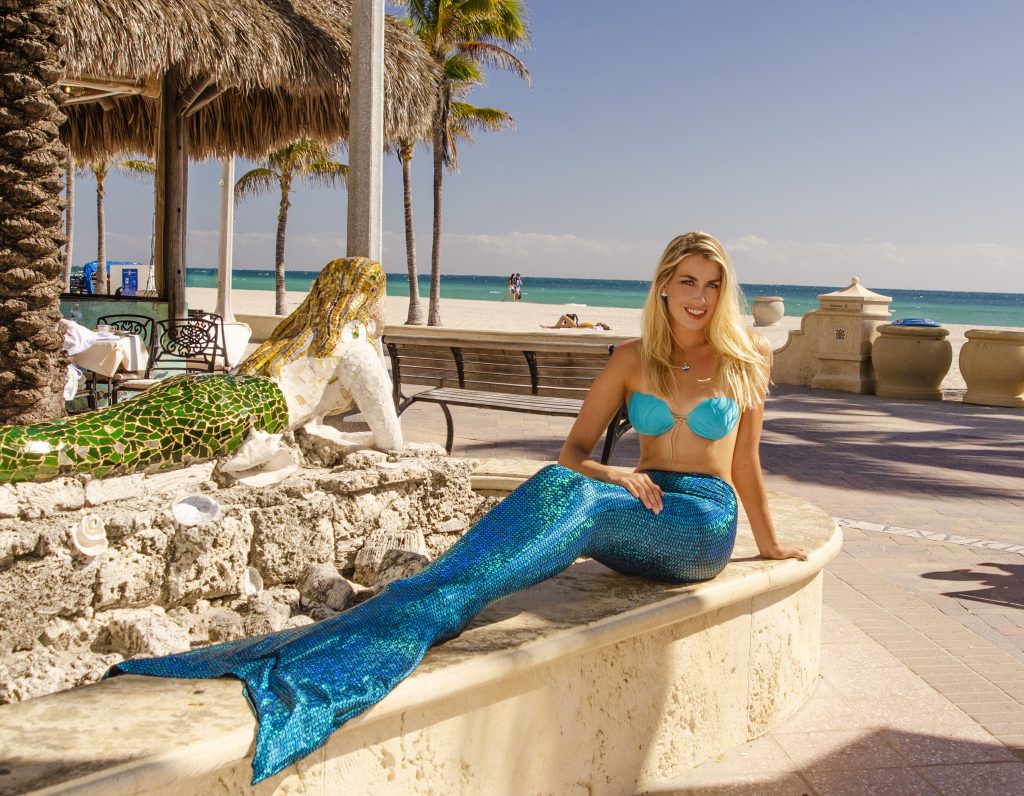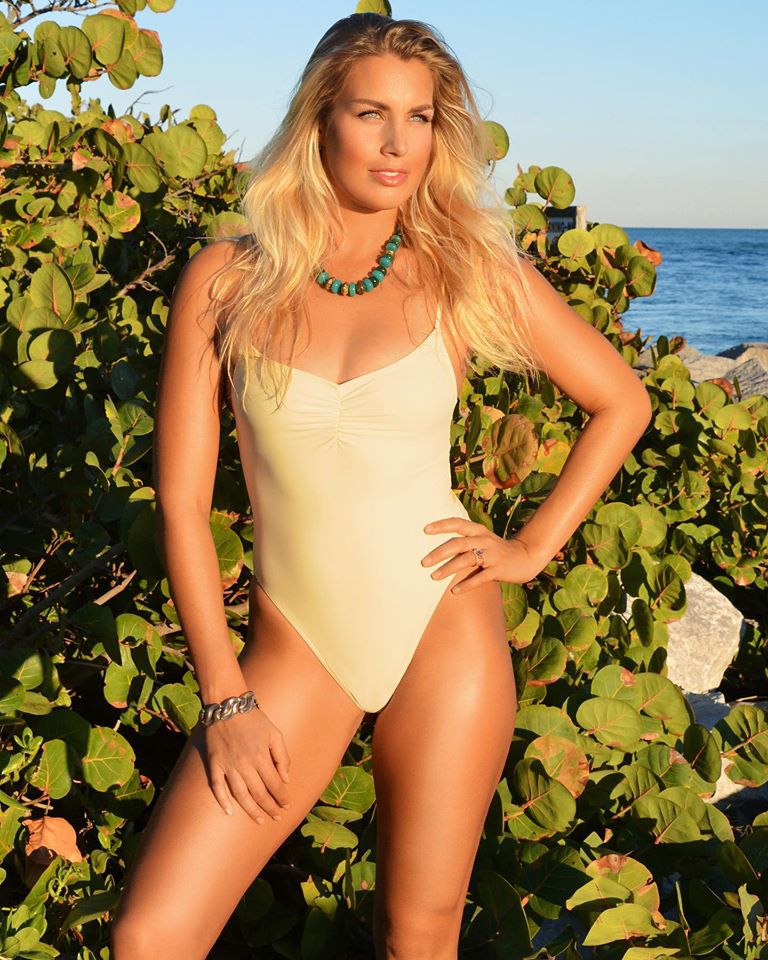Estonian World interviews Estonia’s most famous “mermaid”, the Florida-based Merle Liivand, who is helping save the oceans and, at the same time, hoping to qualify for the Tokyo Olympics; right now, Liivand is also competing for votes to be the Maxim magazine cover girl.
The Estonian professional swimmer, Merle Liivand, is from Tallinn but has lived in Florida for some nine years – training, coaching others and raising awareness of the damage we are causing to our oceans and seas. Liivand is a member of the Estonian national swimming team and a former Baltic champion.
She is also Estonia’s most famous “mermaid” – Merle regularly swims wearing a mermaid fin without using her arms to increase endurance and generate publicity for the oceans. She was the first person to have swum the old 10-kilometre-long (just over six miles) Los Angeles Olympic marathon course as a “mermaid”.
Liivand has been in Florida throughout the novel coronavirus pandemic that has hit the US so much worse than it has in Estonia.
What led you to swimming? I believe you grew up right by the sea in Tallinn and I have heard the saying – the waves move you to where the ocean wants you, so how did a “mermaid” from Estonia end up in Florida?
I had health problems when I was little. My lungs were not really working well and learning to swim was my chance to learn how to breathe and use my lungs. I often spent time in the hospital when I was growing up. Later, it turned out I was gluten-sensitive and this had caused my breathing problems and stomach pain. Swimming was the way to handle this situation because my soul was full of desires to be productive and active, but it seemed like health was holding me back.
My mum, basically, was driving me from the hospital to competitions. When I graduated from high school, my health problems were getting even worse and I wanted to quit swimming. But then there was an opportunity to continue my sport in Florida. I truly didn’t want to move but my mum was the one who thought I should take this road and find myself and my talent. She was right! I found my passion to stand up for oceans and “mermaid” soul!
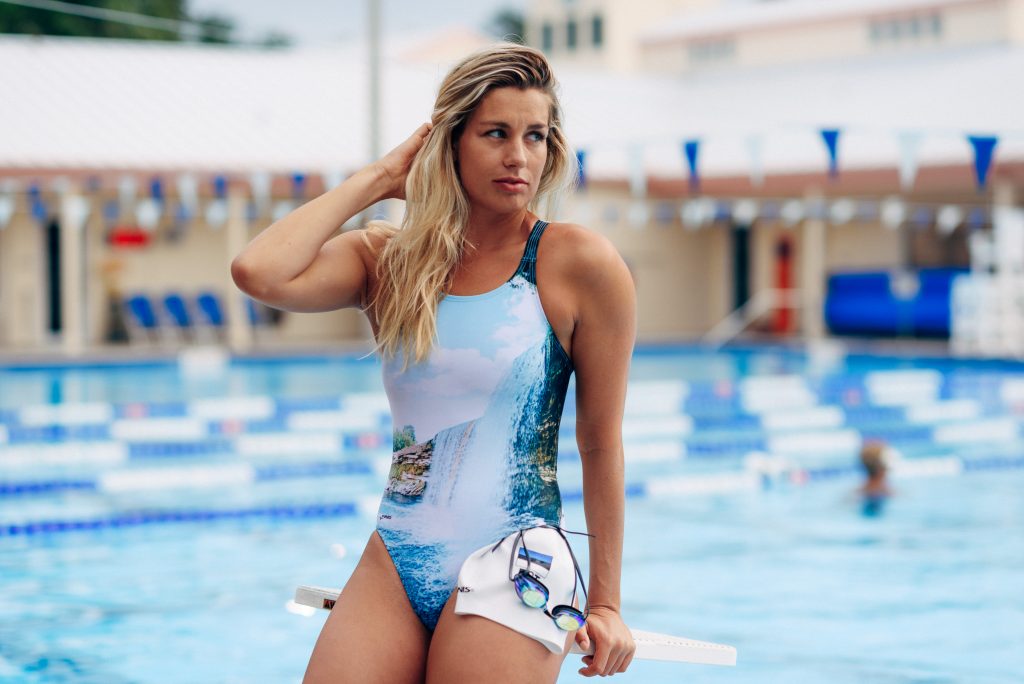
You are the first and the only person in the world with a world record in 10-kilometre “mermaid finswimming”. So how did you become a “mermaid”?
I was always trying to bring more awareness of open water sports to the Scandinavian and Baltic countries and started to participate on an international level at 10-kilometre swimming races. At the same time, I realised that Michael Phelps (an American former competitive swimmer and the most successful and most decorated Olympian of all time – editor) was so good at swimming because he knew how to master the fifth-stroke swimming style (the underwater dolphin kick).
I started to share my passion and promote swimming to people around the world through what I called “mermaid classes”. But there was always a kind of joke around during the world championships that I might be competing 10-kilometre in a “mermaid fin”. That joke went around for three years and so I decided it was time to show the world that I could actually do it! So I did! And without moving my arms – just kicking.
At the same time, I drew attention to our oceans and the microplastic pollution inside the ocean. I think we should not just be talking about how plastic harms our oceans – we should all do something about it, because it affects us all on this planet; I don’t want to move to another planet, so let’s fix this one!
It must be quite tough on normal life and especially for a professional swimmer. Has it affected your routines?
Well, I have faced many obstacles in my life – but I have always embraced difficult times.
I haven’t seen a pool since the end of February, but I have still been swimming in the open sea by the Florida coast every week – sometimes twice a week. But, instead of watching backlines at the bottom of the pool, I have been training with the dolphins and manatees. Re-learning and adapting to the situation – maybe it’s something that comes from having “Estonian blood”?
I know so many people who have had to re-learn their occupation – but isn’t that the beauty of life? You learn new skills from every situation. So, while you are alive and breathing – you should keep learning. Because life is short and worth living.
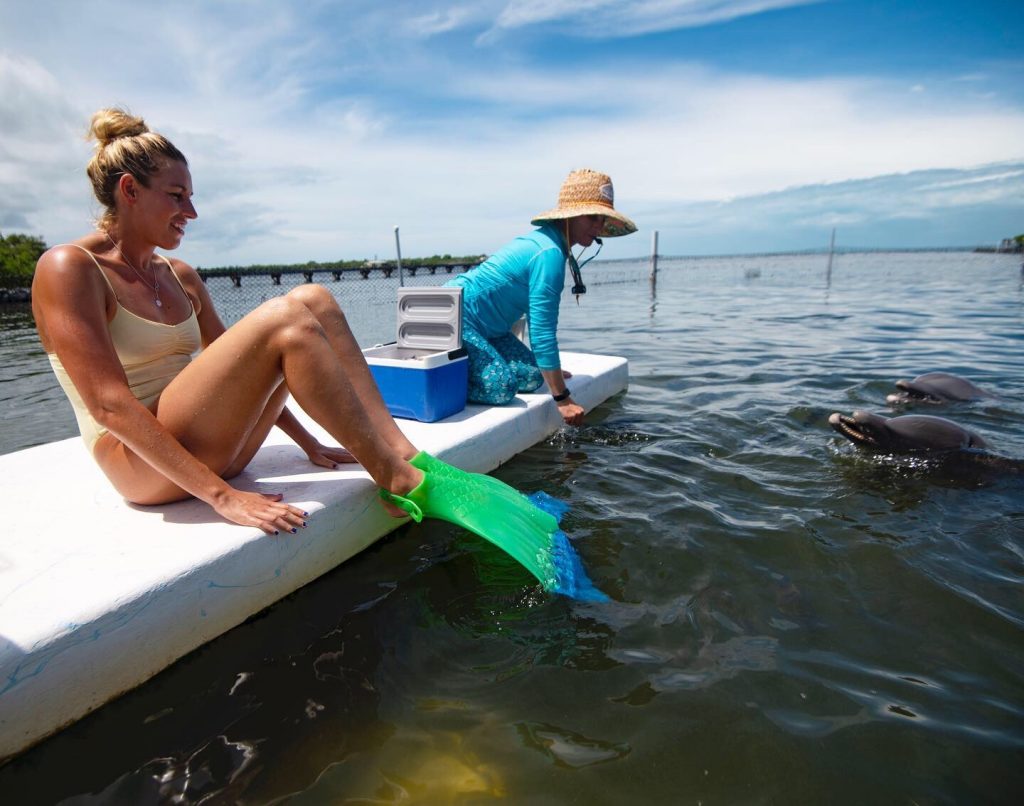
How has the novel coronavirus lockdown impacted your training and preparation for competitions and the Tokyo Olympics?
I have had to make big changes to my training since last year’s World Championships. I and my team were on full ready-to-go mode preparing for the Tokyo Olympic qualifications that should have been held at the end of May. But then life changed – I had to train through Zoom workouts!
Some days, I even run from a Pilates class to a core class, so it has been fun. I always think there is room for improvement, and I am ready to keep at this for an extra year. I even think it’s great because this has given me more time to focus on my weaknesses and more time to clean up the ocean and the streets.
I heard you are also involved with getting competitors ready for the Paralympics.
My company, Swimera, has designed our new “Estonia” collection and, with every sale, we support the Estonian Paralympic swimmers until the Paris Olympics. With this collection, we also want to encourage more kids with special needs to get into swimming. I introduced mermaid swimming to athletes and kids with special needs. Swimming skills can save lives!
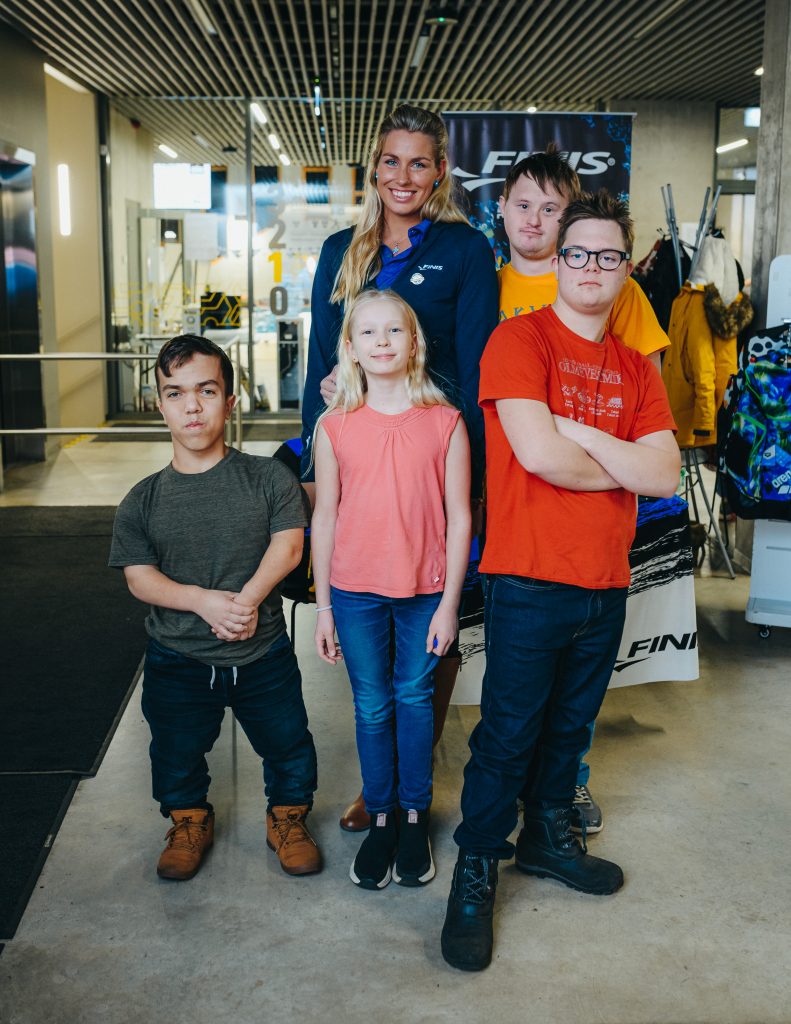
You are deeply committed to raising awareness of environmental issues, such as trash in the oceans; tell us what motivated and inspired you in the beginning?
When I became an open water swimmer, I realised the ocean temperatures had changed in abnormal ways. Sometimes, the swimming events even get cancelled because oceans are too warm or too polluted.
It really made me think. It was the early stage of my wake-up call. Some programmes only fund specific competitions and all this training, time, pain, money and glory can be wasted just because the competition venue is too warm or polluted. When the water is hot, it pushes your heart rate up and can make it hard to compete. Open water swimming has already lost one high-level athlete, Fran Crippen, due to this issue – and as athletes, we never want to see this happen again.
But my last “aha” moment happened during a practice in Florida. I was swimming on a stormy day and microplastics got into to my mouth while breathing. I realised that, as an open water swimmer, I should be doing more than just swimming in it. I think every open water swimmer should take more time to help oceans. Our sport depends on it and we all have the responsibility to do better. Our children depend on it and our food chain depends on clean waters as well.
Recently, we have started to see stories about discarded face masks on the beaches or in the rivers. Have you noticed that as beaches have started to reopen in Florida? What environmental issue is most important to you as an ocean athlete? What do you do to fight this problem?
Yes, sadly I have recently picked up 16 pairs of latex gloves and some masks. Go figure. Note that the lifespan of some disposable masks is 450 years. In this pandemic, we should not be destroying nature but giving it a break. Every single person who wakes up in the morning and breathes clean, fresh air has the responsibility to give back. Why? Because if you don’t take care of the nature and oceans, soon you might not even have clean air to breathe.
Why should the world give you a job, money, things and food, when you don’t contribute to it? We all have a responsibility and every single person should look in the mirror and ask the same question. Maybe you should take a moment and look around the household before going shopping. I go shopping in my granny’s closet sometimes and find and resize her old clothes.
Maybe you should go home and check the food in your fridge for what needs to be eaten soon rather than wasting when it is too late. Maybe you have too many things in your house so you should sell or donate them instead or throwing in the trash. And educate yourself about the brands and products that you buy.
For example, my company sells swimming tools. Our suits and swimming tools, such as fins, are made from 100% marine rubber. Our suits are designed from a special material that lasts long and doesn’t dye the water. We don’t mass produce and we take care of all the materials so they will not end up as waste. The same applies to the mermaid tail materials. Sadly, many swimming companies haven’t got that wake-up call.
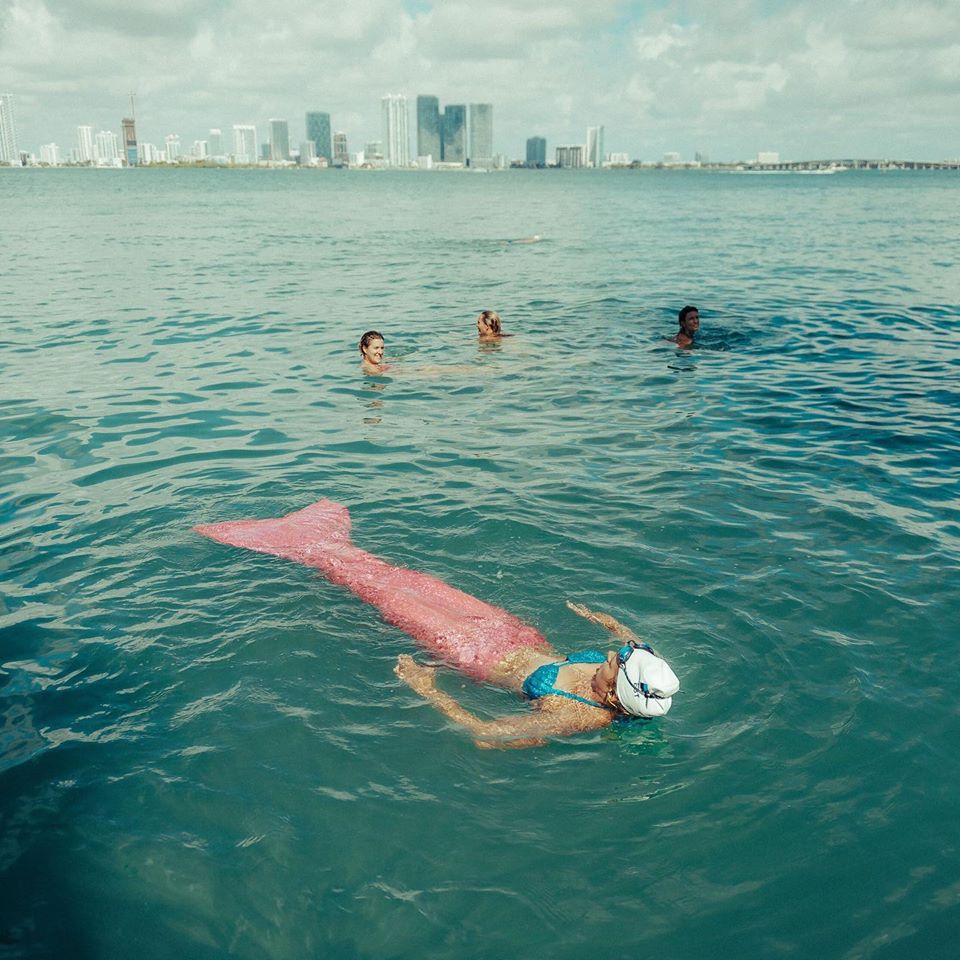
What do you enjoy most about swimming in the open ocean – and what about sharks?
When you’re swimming in the open ocean, you’re never guaranteed to have the same water conditions. When I’m swimming around Miami, I can truly see that every loop around the area is different. Open swimming requires quite a bit of critical thinking at a fast pace. You must be extremely strong, mentally, to deal with the sharks, the jellyfish and large waves. Nothing is in your control, but that is the fun part because you’re forced to cope with the unknown.
And I have to say there is nothing more beautiful than dolphins who come around to “say hello”. I think they must know I look after the ocean.
Swimming is an individual sport. Even though there are swim teams and relays, at the end of the day, you are swimming on your own and it is your effort alone that results in a success or a failure. What do you do to keep yourself motivated in this individual sport?
My mum always taught me that as long when your brain keeps working and your heart keeps pumping, you can do everything. This is so true with swimming. It is my responsibility to get the work done, no one else can do it for me.
I know you have said that teaching someone to swim can save their life. I understand you have also saved someone from drowning.
Yes. I have rescued people at the beach or by a pool. I recently saved an Egyptian guy in Florida at a biathlon championship. The local police sent me an honorary medal and the host committee gifted me with a Team USA bracelet. I believe everyone can learn to swim – it doesn’t matter what shape or size you are. Take action and learn to swim now – before it is too late!
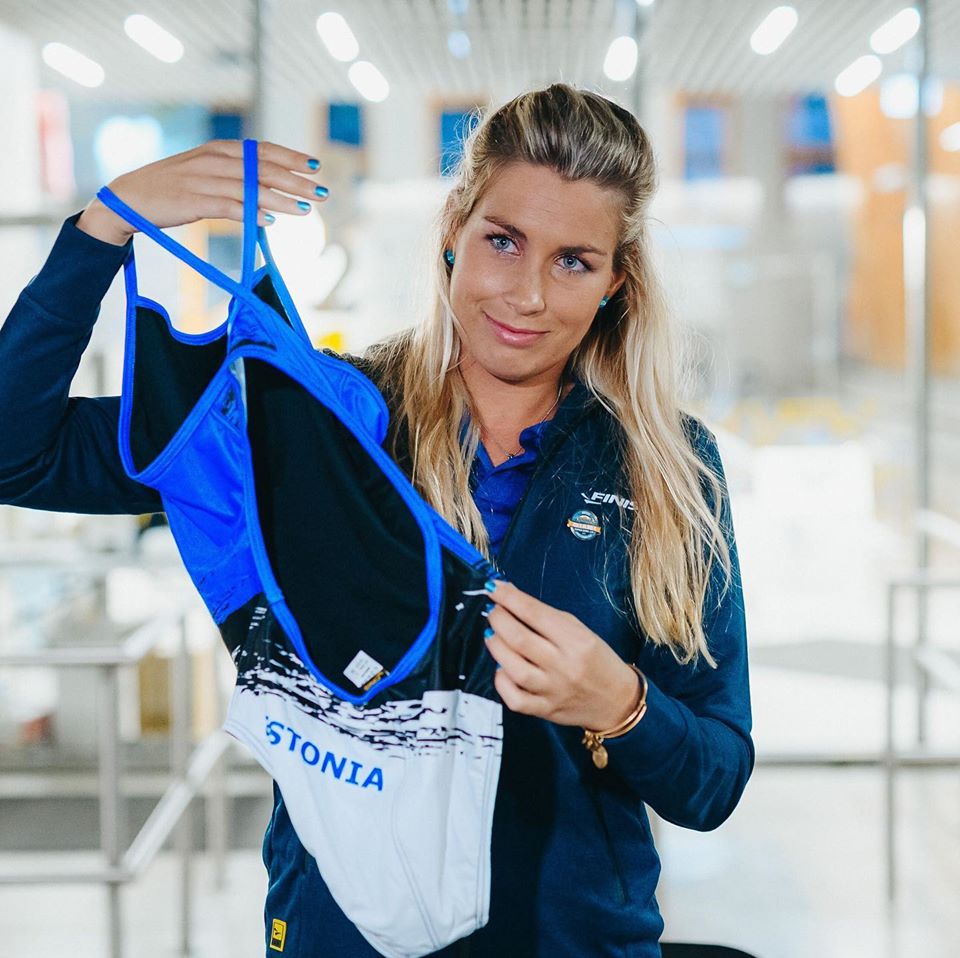
You are in Florida, but your business is based in Estonia. How easy is it to combine your busy schedule and trainings with the entrepreneurship and does being from Estonia help generate entrepreneurial skills? How has it influenced you as a swimmer?
For sure my Estonian background has helped me. I loved how I had the chance to learn entrepreneurship in school. According to the PISA tests, the Estonian education is among the top three countries in the world and I think this gives wings to everyone.
I was once in Argentina during the Youth Olympics and gave speeches at their schools and sports clubs. A local principal and a senator asked me, what made Estonia successful, while we didn’t produce wine or export meat in large quantities or have natural resources, such as gold or oil. My answer was: “Estonian brains”, and that is what I truly believe.
But my work ethic started from home and from my garden. I saw how hard you must work to get food. My mum always made me focus on time management when I was swimming. Between school and swimming, I had to help my family’s businesses, so I gained experiences in so many ways. I used to wake up some days at 4:30 AM, so I could get my work done before practice. I think you can do anything if you want to and you put the work in.
I know you are competing to be a Maxim cover girl. Would you be the first swimmer or the first Estonian if you succeed? If enough people vote for you, how would it help your work on cleaning the oceans?
Yes, it is a big thing because never has a swimmer or an Estonian – or a “mermaid” for that matter – been on the cover of Maxim magazine. And I am trying to also change the stigma that women only must be pretty. I think what makes people beautiful is their goals to achieve something with their own soul and hands, as well as taking the time to learn new skills.
If I win, I will donate the prize to the Ocean Cleanup foundation and water safety. I believe we need to contribute to the nature and the society. But I also know that if I win, I can draw attention to the problems with our oceans.
What would be your advice on how every one of us can make a difference, in helping save the oceans? What steps can every each of us take, big or small, to help the environment and protect the ocean?
We need to go from social models to role models. Sharing information in the social media doesn’t mean you fully help the oceans. It’s good we share information, but let’s use our hands and actually pick up trash when we see it. I sometimes run business meetings while cleaning the beach the same time, for example. Let us show up at clean-ups and take action to make it happen.
Cover: Merle Liivand as a “mermaid”. Images courtesy of Merle Liivand.

